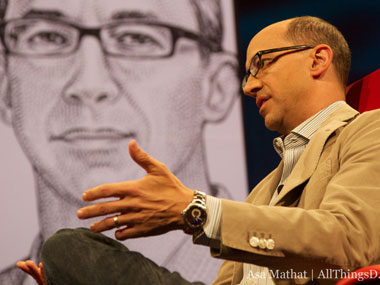Dick Costolo: Twitter Will Stay Simple

Twitter CEO Dick Costolo said today at Fortune Brainstorm Tech that even as Twitter grows at an increasingly speedy rate, it will maintain its focus on being “the world in your pocket,” rather than responding to the Facebook-Google+ feature race.
He also provided some fresh stats: Twitter users now create a billion tweets every five days, the Twitter Web site has 400 million monthly uniques, and mobile usage is growing 40 percent every quarter.
Costolo said that while observers may focus on the comings and goings of Twitter’s founders, his focus has been on building a senior management team, which is nearly complete, save for some senior engineering managers and a marketing executive.
From earlier:
Twitter recently said that its users tweet the equivalent of 8,163 copies of Leo Tolstoy’s “War and Peace” every day. And today, Twitter CEO Dick Costolo will appear on stage at Fortune Brainstorm Tech in Aspen, Colo. to read a day’s worth of tweets in their entirety.
No, not really. But we’ll be liveblogging what Costolo says here — starting at about 3:50 p.m. CT.
2:46 pm: Actually, we’re starting more on time than I thought. Adam Lashinsky is on stage to interview Costolo. He brings up “Trouble at Twitter,” the rather negative recent Fortune cover.
Costolo says Twitter is doing quite well, thanks: A billion tweets every five days (up from seven days at D9 in June), 400 million uniques to Twitter’s web site per month, mobile use growing 40 percent per quarter.
What about Ev Williams and Biz Stone leaving and Jack Dorsey coming back? Costolo says yes, that happened. “In late 2009, we started putting together a senior management team at the company. The media has focused on the founders coming and going, but really what’s happened is we’ve built this senior leadership team.” Ali Rowghani, Michael Abbott, Jack Dorsey.
“We need a couple more senior engineering managers. We are going to be bringing in a senior marketing executive. One of the most interesting things about Twitter is it’s one of the most powerful brands in the world, that blue bird, but we don’t have anyone curating that internally.”
Costolo says he’s under a very strict “don’t break any news on stage rule.” What, are you filing an S-1 too?
Costolo says he and Jack work together particularly well. Dorsey speaks with the fluency of the inventor, which helps decision making.
Lashinsky: Is this a business?
Costolo: “The business is doing fantastically well.”
2:54 pm: “The beauty of our advertising program is the ads are just tweets.” And you can target them to anything you want — accounts, trends, tweets.
Costolo: The fascinating thing about the ad program, philosophically, is when you think about the future of Twitter when being distributed on TVs, phones, everywhere, it creates opportunities for advertisers to do real-time marketing campaigns on a global basis.
Lashinsky: How does this compare with Google AdWords?
Costolo: It’s not self-serve yet but you only pay when people engage with the tweets. We are seeing click-through rates and engagement rates of 30-40-50 percent. It compares very favorably with search.
More stats (I think these are repeats): Number of advertisers on the platform up 600 percent this year, 80 percent renew campaigns.
Costolo fends off requests to say something specific about how much big brands are spending.
Lashinsky: Buying, building, ecosystem… can you articulate what you want to do?
“When Jack came back to the company earlier this year, he and I articulated a very clear vision: Twitter will be the world in your pocket.”
Costolo: We want the ecosystem to provide CRM services, analytics dashboards. We will provide probably a core set of analytics, but people always want more — for instance sentiment analysis for movie openings, spikes around stocks for financial industry — and we’re not going to do that kind of stuff.
Lashinsky: If I were an investor in Twitter, I would be glad you’ve stepped up to do things to make money.
Costolo: I think we’ve been clear that we want to provide an owned-and-operated experience on every platform.
Lashinsky: How concerned are you about this FTC investigation?
Costolo: It’s something we’ll comply with.
Lashinsky: What’s your assessment of Google+?
Costolo: “Google is a powerful, global company, and I fully believe that they will leverage their tremendous reach to pull people into this experience, and they’re already doing that.”
“Our mission is offering simplicity in a world of complexity. If you just look in your side view mirror, you say, ‘Twitter’s going to be the world in your pocket…now with video chat,’ then you lose your way.”
Audience: What do you think of Ad.ly?
Costolo: Advertising is important. Commerce is increasingly too — for instance Google I/O sold $55,000 worth of tickets in 13 minutes with a single tweet. The San Diego Chargers had a similar experience.
“As far as other third parties operating within the platform, what we’ve specifically said is you may not inject ads into the stream. In the particular case of Ad.ly, they go to Twitter users and pay them to say something. I can’t worry about that or police that.”
3:06 pm: Audience question: What do you think of secondary markets?
“The simple answer is it’s a distraction. We and Zynga and Facebook have had to retroactively put lots of policies in place to constrain that. Because it’s a brave new world you worry about the people buying, are they accredited, what do they know, who’s going to get in trouble in the end of the day if it doesn’t work out.”
Lashinsky: Is Twitter profitable?
Costolo: Yeah right, like I’m going to answer that. (paraphrase)
Lashinsky: Are you raising more money?
“We absolutely need to invest in our infrastructure. Whether that’s a public financing or a more private financing, we will make those decisions based on the cost of capital and other factors.”









